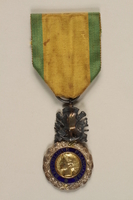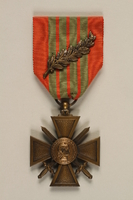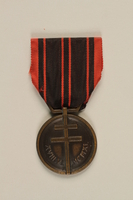Overview
- Brief Narrative
- Certificate for French Resistance Medal and Cross of War medal awarded posthumously to 18 year old Henri Engel, a German Jew living in France, who died while fighting with the French resistance during World War II. The medals were awarded in 1960, to honor Henri as a “magnificent patriot” who died for France. His sister, Margot, accepted them on his behalf in 1961. In September 1939, Henri and his mother, Lucie, were in Lyon, France, when Germany invaded Poland, prompting France and Great Britain to declare war against Germany. They were from Berlin, but were not allowed to leave and reunite with Henri’s sister, Margot, and their father, Erich. In May 1940, Germany invaded France and occupied the northern and western regions, allowing the collaborationist Vichy government to control the south and east, including Lyon. The situation for foreign born Jews in Vichy France became progressively worse, and many faced internment and deportation. In November 1942, Germany invaded Vichy France. Henri joined the underground resistance movement and Lucie went into hiding. Henri's sister and father remained together in Berlin until Margot obtained an exit visa for Shanghai, China, and left. In March 1943, the Berlin Gestapo deported Erich to Auschwitz-Birkenau concentration camp, in German-occupied Poland, where he was killed. On August 7, 1944, Henri was arrested for acts of resistance and taken to Montluc Prison. On August 18, he was executed. Seventy-five members of Henri’s extended family were killed during the Holocaust. Lucie and Margot survived the war and later immigrated to the United States.
- Date
-
issue:
1960 May
commemoration: 1944 August 07-1944 August 18
- Geography
-
issue:
France
- Credit Line
- United States Holocaust Memorial Museum Collection, Gift of Margot Engel
- Markings
- front, top center, preprinted and typed, black ink : EXTRAIT / du DÉCRET en date du 18 Mai 1960 / publié au J. O. du 24 Mai 1960 / portant concessions de la MEDAILLE MILITAIRE / ARTICLE 1er : Sont décorés de la MEDAILLE MILITAIRE, les mili-/ taires dont les noms suivent : [EXCERPT / OF THE ORDER dated May 18, 1960 / published in the (O.?) of May 24, 1960 / issuing concessions of the MILITARY MEDAL / ARTICLE 1: MILITARY MEDAL are decorated with the following names:]
front, middle, typed, black ink : A TITRE POSTHUME / ENGEL Henri - 2° Classe - / “ Magnifique pàtriote. Arrêté pour faits de résistance / “ le 7 Août 1944, a été interné jusqu’au 18 août 1944, date à / “ laquelle il est mort glorieusement pour la France.” / CES CONCESSIONS COMPORTENT : / 1°) l’attribution de la croix de guerre avec palme, à titre / posthume, ells annulent les citations accordées antérieure-/ ment por les mêmes faits. / 2°) l’attribution de la Médaille de la Résistance, à titre / posthume (application des prescriptions de l’article 9 / de la loi N° 48.I251 du 6 Août 1948). [POSTUMOUSLY / ENGEL Henri - 2nd Class - / "Magnificent patriot. Arrested for acts of resistance / "on August 7, 1944, was interned until August 18, 1944, when he died gloriously for France." / THESE CONCESSIONS INCLUDE: / 1) the attribution of the crosses of war with palm, in title / posthumous, they cancel the citations previously granted for the same facts. (2) the granting of the Resistance Medal, posthumously (application of the provisions of article 9 / of Act No. 48.I251 of 6 August 1948).]
front bottom, typed, black ink : signé : Charles de GAULLE / Par le Président de la République / LE PREMIER MINISTRE / signé : Michel DEBRE / LE MINISTRE DES ARMEES,/ POUR AMPLIATION / L’Administrateur Civil de / 1°Classe SOMMAIRE / Chef du Bureau “DECORATIONS” signé : Pierre MESSMER / P.O. le Capitaine BITAUD / illegible signature [Charles de GAULLE / By the President of the Republic / THE PRIME MINISTER / signed: Michel DEBRE / THE MINISTER OF THE ARMIES, / FOR (EXTENSION?) / The Civil Administrator of / 1 ° Classe SUMMARY / Head of the Bureau "DECORATIONS" signed: Pierre MESSMER / PO Captain BITAUD] - Contributor
-
Subject:
Henri Engel
Issuer: French National Committee of Liberation
- Biography
-
Henri Engel was born on June 20, 1926, in Berlin, Germany, to a Jewish couple, Erich and Lucie Simonin Engel. Erich was born on January 29, 1891, in Culmsee, Germany (Chełmża, Poland), to Jakob and Rosa Cohn Engel. He was a businessman. On March 3, 1915, in Frankfurt am Main, Germany, Erich married Lucie, who was French. Henri’s older sister, Margot, was born on January 9, 1916. Henri was a painter. On January 30, 1933, Adolf Hitler was appointed Chancellor of Germany. Anti-Jewish decrees were passed that restricted every aspect of Jewish life. In the mid-1930’s, conditions worsened for Jews in Germany as more punitive anti-Jewish laws were enacted. On November 9 and 10, 1938, during the Kristallnacht pogrom, Jewish people and their businesses and homes were attacked and vandalized. Following his Bar Mitzvah in summer 1939, Henri and his mother, Lucie, travelled to Lyon, France, so that he could attend boarding school there.
On September 1, 1939, Germany invaded Poland. Two days later, France and England responded by declaring war against Germany. Henri and Lucie were unable to leave France and had no way to rejoin Erich and Margot in Berlin. In May 1940, Germany invaded France, and in June German forces occupied Paris. On June 22, France signed an armistice with Germany, which allowed it to annex the provinces of Alsace and Lorraine and occupy northern and western France. Southern and eastern regions, including Lyon where Henri and Lucie were living, were referred to as the French free zone and were administered by the French collaborationist government headquartered in Vichy. In the fall, the Vichy government passed anti-Semitic legislation patterned on German laws. In March 1941, the General Commissariat for Jewish Affairs was formed to manage the new laws, enforce the confiscation of Jewish property and possessions, and supervise the internment of foreign born Jews in detention camps. Henri joined the underground French resistance movement and Lucie went into hiding. In Berlin, Margot was able to secure an exit visa for Shanghai, China, and left Berlin on the last train out. On March 3, 1943, the Berlin Gestapo put Henri’s father, Erich, on transport 35 and deported him to German-occupied Poland. On March 6, Erich’s transport train arrived at Auschwitz-Birkenau concentration camp.
On August 7, 1944, Henri was arrested for acts of resistance and imprisoned at Montluc Prison, which was under the control of Gestapo chief SS Obersturmfuhrer Klaus Barbie, the Butcher of Lyon. Prisoners lived in overcrowded conditions and were regularly tortured and interrogated. On August 18, Henri was executed. On September 3, 1944, Lyon was liberated from German control. On May 7, 1945, Germany surrendered. Henri’s mother, Lucie, survived in hiding and later immigrated to the United States. Margot married, and later she and her husband immigrated to the US. In 1960, the French Government awarded Henri three posthumous medals of resistance, which his sister, Margot, accepted on his behalf in 1961 in a ceremony in New York City. She later settled in Boca Raton, Florida. Seventy-five members of Henri’s extended family were killed in the Holocaust.
Physical Details
- Language
- French
- Classification
-
Information Forms
- Category
-
Certificates
- Object Type
-
Certificates (aat)
- Physical Description
- Certificate printed on rectangular, discolored white paper with a double line border around the perimeter, a red line within the blue, glued to a larger, rectangular, light brown cardboard backer. Embossed in the lower left corner is the Great Seal of France: a seated woman in a crown and robe, Liberty, holds a torch within a ring of French text. The certificate has preprinted text with added personal details typewritten in black ink. It describes 2 medals (2011.160.3 - .4) awarded posthumously for acts of bravery and resistance against Germany and its allies during World War II. There are worn areas of cardboard around the edge where a previously adhered object has been removed.
- Dimensions
- overall: Height: 15.250 inches (38.735 cm) | Width: 9.500 inches (24.13 cm)
pictorial area: Height: 10.625 inches (26.988 cm) | Width: 8.250 inches (20.955 cm) - Materials
- overall : paper, ink, cardboard, adhesive
- Inscription
- front, bottom left, embossed seal : SECRETARIAT D’ETAT A LA GUERRE / REPUBLIQUE FRANCAIS [SECRETARY OF STATE TO THE WAR / FRENCH REPUBLIC]
Rights & Restrictions
- Conditions on Access
- No restrictions on access
- Conditions on Use
- No restrictions on use
Keywords & Subjects
Administrative Notes
- Legal Status
- Permanent Collection
- Provenance
- The certificate was donated to the United States Holocaust Memorial Museum in 2011 by Margot Engel, the sister of Henri Engel.
- Funding Note
- The cataloging of this artifact has been supported by a grant from the Conference on Jewish Material Claims Against Germany.
- Record last modified:
- 2022-07-28 18:26:34
- This page:
- https://collections.ushmm.org/search/catalog/irn43990
Download & Licensing
In-Person Research
- By Appointment
- Request 21 Days in Advance of Visit
- Plan a Research Visit
- Request to See This Object
Contact Us
Also in Henri Engel collection
The collection consists of posthumous award certificates and medals relating to the experiences of Henri Engel as a German Jewish resistance fighter in Lyon, France during World War II.
Date: 1939-1960

French Médaille Militaire with ribbon awarded to a German Jewish resistance fighter
Object
French Military Medal awarded posthumously to 18 year old Henri Engel, a German Jew living in France, who died while fighting with the French resistance during World War II. The medal was awarded by the French Republic to honor acts of courage and dedication. It was awarded to Henri in 1960, and his sister, Margot, accepted it on his behalf in 1961. In September 1939, Henri and his mother, Lucie, were in Lyon, France, when Germany invaded Poland, prompting France and Great Britain to declare war against Germany. They were from Berlin, but were not allowed to leave and reunite with Henri’s sister, Margot, and their father, Erich. In May 1940, Germany invaded France, and occupied the northern and western regions, allowing the collaborationist Vichy government to control the south and east, including Lyon. The situation for foreign born Jews in Vichy France became progressively worse, and many faced internment and deportation. In November 1942, Germany invaded Vichy France. Henri joined the underground resistance movement and Lucie went into hiding. Henri's sister and father remained together in Berlin until Margot obtained an exit visa for Shanghai, China, and left. In March 1943, the Berlin Gestapo deported Erich to Auschwitz-Birkenau concentration camp, in German-occupied Poland, where he was killed. On August 7, 1944, Henri was arrested for acts of resistance and taken to Montluc Prison. On August 18, he was executed. Seventy-five members of Henri’s extended family were killed during the Holocaust. Lucie and Margot survived the war and later immigrated to the United States.

French Croix de Guerre with bronze palm awarded to a German Jewish resistance fighter
Object
French Cross of War medal with bronze palm awarded posthumously to 18 year old Henri Engel, a German Jew living in France, who died while fighting with the French resistance during World War II. It was awarded by the French National Committee of Liberation to honor remarkable acts of faith and courage by the French people. It was awarded to Henri in 1960, and his sister, Margot, accepted it on his behalf in 1961. In September 1939, Henri and his mother, Lucie, were in Lyon, France, when Germany invaded Poland, prompting France and Great Britain to declare war against Germany. They were from Berlin, but were not allowed to leave and reunite with Henri’s sister, Margot, and their father, Erich. In May 1940, Germany invaded France, and occupied the northern and western regions, allowing the collaborationist Vichy government to control the south and east. The situation for foreign born Jews in Vichy France became worse, and many faced internment and deportation. In November 1942, Germany invaded Vichy France. Henri joined the underground resistance movement and Lucie went into hiding. Henri's sister and father remained together in Berlin until Margot obtained an exit visa for Shanghai, China, and left. In March 1943, the Berlin Gestapo deported Erich to Auschwitz-Birkenau concentration camp, in German-occupied Poland, where he was killed. On August 7, 1944, Henri was arrested for acts of resistance and taken to Montluc Prison. On August 18, he was executed. Seventy-five members of Henri’s extended family were killed during the Holocaust. Lucie and Margot survived the war and later immigrated to the United States.

French Médaille de la Résistance with ribbon awarded to a German Jewish resistance fighter
Object
French Resistance Medal awarded posthumously to 18 year old Henri Engel, a German Jew living in France, who died while fighting with the French resistance during World War II. It was awarded by the French National Committee of Liberation to honor remarkable acts of faith and courage by the French people. It was awarded to Henri in 1960, and his sister, Margot, accepted it on his behalf in 1961. In September 1939, Henri and his mother, Lucie, were in Lyon, France, when Germany invaded Poland, prompting France and Great Britain to declare war against Germany. They were from Berlin, but were not allowed to leave and reunite with Henri’s sister, Margot, and their father, Erich. In May 1940, Germany invaded France, and occupied the northern and western regions, allowing the collaborationist Vichy government to control the south and east. The situation for foreign born Jews in Vichy France became progressively worse, and many faced internment and deportation. In November 1942, Germany invaded Vichy France. Henri joined the underground resistance movement and Lucie went into hiding. Henri's sister and father remained together in Berlin until Margot obtained an exit visa for Shanghai, China, and left. In March 1943, the Berlin Gestapo deported Erich to Auschwitz-Birkenau concentration camp, in German-occupied Poland, where he was killed. On August 7, 1944, Henri was arrested for acts of resistance and taken to Montluc Prison. On August 18, he was executed. Seventy-five members of Henri’s extended family were killed during the Holocaust. Lucie and Margot survived the war and later immigrated to the United States.
Certificate for a French Médaille Militaire awarded to German Jewish resistance fighter
Object
Certificate for the French Military Medal awarded posthumously to 18 year old Henri Engel, a German Jew living in France, who died while fighting with the French resistance during World War II. The medal was awarded in 1960, to honor Henri’s death while fighting for France. His sister Margot accepted it on his behalf in 1961. In September, 1939, Henri and his mother, Lucie, were in Lyon, France, when Germany invaded Poland, prompting France and Great Britain to declare war against Germany. They were from Berlin, but were not allowed to leave and reunite with Henri’s sister, Margot, and their father, Erich. In May 1940, Germany invaded France, and occupied the northern and western regions, allowing the collaborationist Vichy government to control the south east. The situation for foreign born Jews in Vichy France became progressively worse, and many faced internment and deportation. In November 1942, Germany invaded Vichy France. Henri joined the underground resistance movement and Lucie went into hiding. Henri's sister and father remained together in Berlin until Margot obtained an exit visa for Shanghai, China, and left. In March 1943, the Berlin Gestapo deported Erich to Auschwitz-Birkenau concentration camp, in German-occupied Poland, where he was killed. On August 7, 1944, Henri was arrested for acts of resistance and taken to Montluc Prison. On August 18, he was executed. Seventy-five members of Henri’s extended family were killed during the Holocaust. Lucie and Margot survived the war and later immigrated to the United States.



